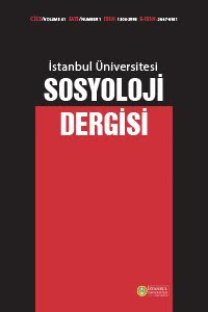Non-formal Education for Sustainable Society: A Case Study of “Hobby School” in Estonia Hideki Maruyama*, Kersti Sogel**
2005 ve 2014 yılları arasında Birleşmiş Milletler Sürdürülebilir Kalkınma için Eğitim Onyılı sürdürülebilirliğimiz üzerine düşünmek adına resmî bir küresel hareketti. Birçok ülkede birçok faaliyetlerle, eğitimin doğal, kültürel, ekonomik ve sosyal bakımdan sürdürülebilir bir çevre için sahip olduğu önemli rol tartışılmıştı. Okul eğitimi, resmî ve okul-dışı daha esnek uygulamalarsa gayrıresmî eğitim olarak adlandırılmaktadır. Okul devletce remiyete büründürülürken, gayrıresmî eğitimin taşıyıcısı gönüllülerdir. Küreselleşen dünyada ayakta kalabailmek için bilgi ekonomisine odaklanan Estonya gibi küçük bir ülkede, nevi şahsına münhasır karakteri, kendi sürdürülebilirliği açısından oldukça önemlidir. Estonya’da eğiştim sistemi başarılı olsa da, ayrıca gayrıresmî eğitim kurumları da mevcuttur. Bu makale uzun soluklu bir gayrıresmî eğitim kurumunu merkeze alarak Estonya ulusal kimliğinin nasıl sürdürülebilir kılındığını göstermektedir
Anahtar Kelimeler:
Sürdürülebilir Kalkınma için Eğitim, sürdürülebilirlik, gayrıresmî eğitim, ulusal kimlik, Estonya
Non-formal Education for Sustainable Society: A Case Study of “Hobby School” in Estonia Hideki Maruyama*, Kersti Sogel**
The United Nations Decade of Education for Sustainable Development from 2005 to 2014 was an official global movement to reflect our sustainability. There were many remarkable activities across countries because education had a significant role for sustainable environments in natural, cultural, economic, and social aspects. School education is often called formal education, and more flexible practices are non-formal education (NFE). School is authorized by the governments, and NFE includes more autonomous and volunteer learnings. A small country such as Estonia concentrates on knowledge economy to survive in the globalized world today, but its identity is implicitly more important to sustain. The Estonian education system is successful, and meantime, it has many NFE, especially education focusing on nature. This article picks up a long-lasting NFE case and tries to illustrate how NFE keeps their worship to nature as the central portion of the Estonian national identity.
Keywords:
ESD, sustainability, non-formal education, national identity, Estonia,
___
- Collins, A. & Halverson, R. (2009). Rethinking Education in the Age of Technology. NY: Teachers College Press.
- Coombs, P.H. Prosser, R.C. & Ahmed, M. (1973). New Paths to Learning for Rural Children and Youth, NY: ICED.
- Haridus- ja Teadus ministeerium [Ministry of Education and Research] (2013). Education in Estonia. Tartu: Author.
- Krull, E. & Trasberg, K. (2007). Changes in Estonian general education from the collapse of the Soviet Union to EU entry. Tartu: Tartu University. No ED 495 353.
- Organisation for Economic Co-operation and Development (2012). PISA 2012 Results in Focus: What 15-year-olds know and what they can do with what they know, Paris: OECD.
- Maruyama, H. & Ohta, M. (2013). Non Formaru Kyoiku no Kanousei [Possibility of Non-Formal Education]. Tokyo: Shin-Hyoron.
- Raun, T. U. (2001). Estonia and the Estonians, CA: Hoover Institution Press.
- Rein, T. (1981). The Population Crisis and the Baltics, Journal of Baltic Studies, 12: 238-240.
- Rogers, A. (2004). Non-Formal Education: Flexible Schooling or Participatory Education?, Hong Kong: University of Hong Kong.
- Tartu Keskkonnahariduse Keskus [Tartu Environemental Education Centre] (2013). Estonia-Latvia-Russia Cross Border Cooperation Programme Project “Promoting nature education as efficient mean of awareness raising” or “People with Nature” Joint Manual. ENPI Cross Border Cooperation Programme. (http://www.tartuloodusmaja. ee/)
- Toots, A., Plakk, M. & Idnurm, T. (2009). National Policies and Practices on ICT in Education: Estonia. In Tjeerd Plomp, Ronald E. Anderson, Nancy Law, Andreas Quale (Eds.) Cross-National Information and Communication Technology Policies and Practices in Education, 2nd ed. (pp. 279 - 296). Information Age Publishing.
- Vihhoreva, I. (2012). Streikimise pohjused ja tagajarjed 2012. Aasta eesti opetajate streigi naitel [Reasons and consequences of striking of 2012, as examplified by Estonia teachers]. Bachelor thesis. Tartu University, Faculty of Economics. (https://dspace. utlib.ee/dspace/ bitstream/handle/10062/28721/Vihhoreva_Irina.pdf).
- World Commission on Environment and Development (1987). Our Common Future. Oxford: Oxford University Press.
- ISSN: 1304-2998
- Başlangıç: 2020
- Yayıncı: İstanbul Üniv. Edebiyat Fak. Sosyoloji Böl.
Sayıdaki Diğer Makaleler
Eğitimsel ve Antropolojik Kuramın Buluşması
Eğitim Hakkını Yeniden Düşünmek: Sosyolojik Bir Çözümlemeye Doğru
ABD’de Ev Okulu Uygulamasının Tarihsel Gelişimi ve Bugünkü Durumu Üzerine Bir Değerlendirme
Antonio Gramsci’nin Demokratik Eğitim Modeli
Abdullah DURAKOĞLU, Ülkü GÜNEY
An Evaluation of the Historical Development and Recent State of Homeschooling in the USA
Tıp Eğitiminde Görsel Sanatın Etkisi
Türk Eğitim Sisteminde Okullar ve Dershaneler: Çoklu Paradigma Açısından Bir İnceleme
